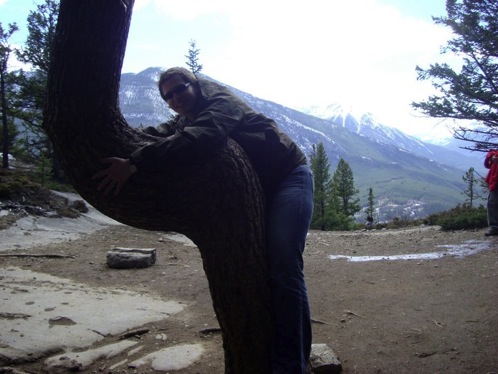the Seeds of Science
Your source for the latest from the University of Toronto's department of Ecology and Evolutionary Biology
How to conference, honey!

We will all head to a conference at some point during our time as a student. And although we know that they are good for us many of us find this academic tradition overwhelming. So much so that we sometimes avoid them or don’t get the most out of them when we do attend. Hoping to learn from some experienced graduate students, theSeedsofScience has asked Emily Josephs and Robert Williamson for their top tips for tackling this tricky forum.
Selling your science
“Eugene, I’m in the persuasion business, and frankly I’m disappointed by your presentation.” — Peggy, Mad Men
Whether you’re presenting a talk, poster, or neither, you absolutely need to prepare a 1-2 sentence description of your research question. You are going to meet dozens of people, and 90% of them will ask: “What do you work on?”. Write it down, then say it out loud, try it on your friends, and memorise it so you can deliver it seamlessly when you’ve had three glasses of wine and haven’t slept for two days.
If you’re giving a talk, practice. A lot. Practice at least once for your core research group and once more for someone outside of your speciality. Don’t be afraid to explain basic things in your presentations. Even those audience-members who know your discipline intimately will likely be worn out from previous presentations and will appreciate your efforts to be simple and clear.
 An example faux-transition using PDF slides. On the first slide I talk about TE dynamics in outcrossers, then when I start talking about selfers I move to the next slide, which looks like an “appear” animation from powerpoint.
An example faux-transition using PDF slides. On the first slide I talk about TE dynamics in outcrossers, then when I start talking about selfers I move to the next slide, which looks like an “appear” animation from powerpoint.
Powerpoint presentations have been known to spontaneously mutate when transferred between computers. If you want to avoid saying things like “well, there should be some red points on this plot too…”, or “I did have a title slide, but it appears to have disappeared…”, you should consider saving your presentation as a PDF. You can replace the Powerpoint transitions function by having a second slide where new information appears between each of your pages in the PDF (look right for an example).
If you’re presenting a poster, make sure you have a mini-talk ready to go. This should never be more than a minute (2 minutes maximum). Be ready for people to interrupt you and always have the punch line of your talk on hand. It can also be a good idea to have a friend ready to come up to your poster and listen to your talk, having someone else already listening can encourage other people to come by. Finally, during the poster session it is not critical to stay at your poster the entire time, you should go talk to other people who have posters you are interested in.
When you are first applying to present at your conference of choice be careful picking keywords and try to stick with conceptual topics, not organism names or techniques. If not, you risk getting grouped with other presenters who may work on the same organism, but ask entirely different questions, and then you won’t have as good an audience.
Decisions, decisions
“You were not the first choice, but you are the last one, and the right one.” — President Bartlett, The West Wing
Deciding which talks to go to is arguably the most difficult set of decisions you will make at a conference. There are many different schools of thought on this topic. It can be hard to find the right balance between supporting your colleagues, seeing talks by researchers whose work you’re really familiar with, and broadening your horizons by going to talks outside your discipline. We haven’t found a perfect strategy but we definitely suggest asking more experienced colleagues for recommendations on talks (or just following them around, just try and be subtle).
Many conferences are also organised into a series of concurrent sessions, with some unifying theme. It’s easy to pick talks in different sessions and try to run between them but this gets tiring quickly. Instead, consider looking for sessions with 2 or 3 talks you definitely want to see and sitting through the whole thing. You may learn some things slightly outside your field that you wouldn’t have seen otherwise.
Making friends
“When the snows fall and the white winds blow, the lone wolf dies but the pack survives.” — Ned Stark, Game of Thrones
Meeting people and telling those that might not read your papers about your research is more important than going to every talk. You can always read the paper the talk is based on later, you can’t as easily talk to big names in your field every day.
You should figure out a strategy that makes you comfortable meeting new people. Here are a few ideas:
- Just walk up and introduce yourself.
- Have a mutual friends introduce you. Advisors are also useful for this.
- E-mail them before/during the conference and arrange to meet.
- If they are really hard to track down, take a page from journalists, and organise to meet them and tell them you’ll bring coffee.
It’s a good idea to have something planned to ask them about their presentation, an explanation of how their work relates to yours, or questions about their future plans (especially if you have a cool idea for them). Also, if you’re interested in having an extended conversation, it never hurts to ask someone to have lunch/coffee/dinner with you.
Get your Tweet on
“It makes me feel like a bird. “ — Big Bird, Sesame Street
Most conferences these days have a Twitter hashtag associated with them. Just browsing these can give you an idea of what some of the biggest impact talks have been, and ideas of people to talk to.
Don’t be afraid to tweet talks yourself, it is a great way to start a dialogue with people you wouldn’t necessarily have interacted with otherwise. Posing questions about talks on twitter can also lead to further face to face discussions.
If you are tweeting about talks, try to include the speakers initials and last name in your first tweet about the talk, and initials thereafter. Alternatively, use their Twitter handle.
Sleeping, eating, and other minor inconveniences
“No one looks back on their life and remembers the nights they had plenty of sleep.” — Anonymous
Conferences are exhausting. Very few of us can make it through every talk in every session without some breaks. Taking some time to your self to recuperate is not only okay, but required.

Go outside for a walk/run/sit in the grass, or just take a nap during a session to catch up on missed sleep.
Conferences can also be tough on your stomach. It is easy to skip meals and then eat too many sugary muffins/cookies at breaks, starting a terrible cycle of sugar highs and crashes. Try taking protein bars and fruit with you for a hotel room breakfast (you can sleep a bit longer too!)
“Lucille: Get me a vodka rocks.
Michael: Mom, it’s breakfast.
Lucille: And a piece of toast.“ — Arrested Development
We hope these tips will help you make your next conference more productive and enjoyable. Maybe this post has given you some new ideas we haven’t pointed out! Seeds of Science will open comments below for additional conference hints and tips.

